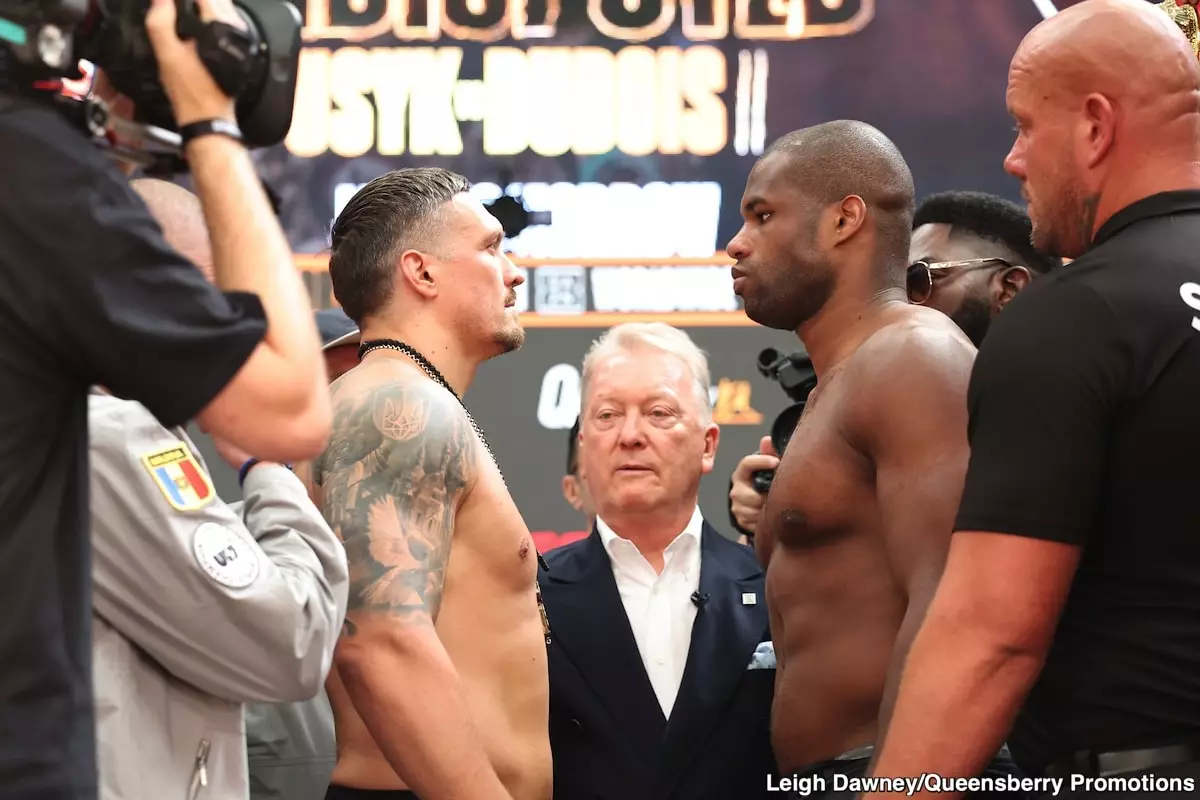In the grand roar of Wembley Stadium, a new chapter in heavyweight boxing was written under the bright lights and roaring crowds. Oleksandr Usyk, a champion whose name is synonymous with technical brilliance and relentless resilience, emerged victorious in a stunning and decisive fashion against Daniel Dubois. While expectations favored a close decision or a grueling technical battle, Usyk’s rapid knockout in the fifth round sent shockwaves through the boxing community, confirming his status not merely as a champion but as a ruler of the heavyweight division’s soul.
What makes this victory truly remarkable extends beyond the victory itself. It was a testament to Usyk’s evolution—a fighter who combines refined skill with an aggressive edge, especially when confronted with an opponent eager to test his limits. Dubois, riding a wave of recent knockouts, entered the ring emboldened, believing his power and recent form could breach the defenses of the Ukrainian master. However, the fight’s unexpected end showcased how skills, strategy, and mental toughness can overcome raw strength. Usyk’s ability to seize an opening and deliver a thunderous left hand demonstrated both his tactical intelligence and his growing capacity to inflict damage, despite being a technically sound boxer who generally focuses on precision rather than power. This victory signals a new phase in his career—an undisputed reign that’s rooted in versatility and unyielding determination.
Challengers and the Myth of Momentum
Dubois’s recent knockout streak—stopping fighters such as Joshua, Hrgovic, and Miller—had generated momentum and inflated expectations of his potential. It seemed he had to be reckoned with, especially given his size and knockout power. But these wins, while impressive on paper, were against opponents limited in movement and defensive acumen. These victories were, in essence, the boxing equivalent of firing blanks—momentary flashes of strength against a lack of quality opposition. When confronted with a fighter like Usyk, who moves with the grace of a welterweight and possesses the tactical IQ of a seasoned chess master, that power becomes less relevant.
Dubois’s confidence was partly justified, but it also blinded him to the deeper layers of the sport—the relentless mental and technical aspects that define true champions. His overreaching in the fifth round was emblematic of that overconfidence, a common trap for fighters riding a wave of recent success. The reckless pursuit of a knockout at this stage—without regard for the circumstances—made him vulnerable. Usyk’s clever counterpunching and strategic patience proved that raw power alone cannot guarantee victory. His ability to capitalize on Dubois’s mistake showcased the crucial importance of discipline and ring intelligence over brute force.
Undercard Fights: A Mixed Bag of Skill and Strategy
On the undercard, the evening revealed the chasm between fighters at different stages of their careers and their respective levels of preparation. Lawrence Okolie displayed his physical dominance against Kevin Lerena, but his weight—a staggering 262 pounds—raised questions about his longevity and effectiveness. Heavyweight fighters often face a delicate balance; overwhelming size can hinder agility and stamina, which are essential for sustained success at the highest level. Okolie’s decision to bulk up so substantially appears to have compromised his speed and energy, making him less of a knockout threat and more of a cumbersome force.
Meanwhile, fighters such as Daniel Lapin and Solomon Dacres demonstrated the class and grit needed to succeed in the division. Lapin’s narrow victory over Edmondson revealed the importance of clean punching and technical discipline, even if the judging appeared generous. Dacres, on the other hand, showcased superior boxing fundamentals and relentless pressure, schooling his opponent with ease and earning a comprehensive decision. These fights serve as microcosms of the evolving heavyweight landscape—emphasizing that raw power must be complemented by strategic intelligence and efficiency.
Interestingly, some fighters exhibited superficial confidence, but their performances exposed underlying flaws. Dacres’s dominance was rooted in precision and use of fundamentals, unlike the lethargic, defensively vulnerable Sirenko. This contrast highlights that the future of heavyweight boxing depends increasingly on a blend of athleticism and refined technique rather than mere size and knockout power.
The Future: Power, Resilience, and the Mindset of a Champion
Usyk’s victory over Dubois is not just another title defense but a statement about the importance of adaptability and mental resilience. Dubois’s recent string of knockouts was likely a hype-driven illusion; facing an artist like Usyk, who can switch from meticulous technician to ferocious finisher, reveals the dangerous allure of overconfidence. The question now is whether Dubois possesses the mental fortitude to bounce back from this setback or if he will crumble under the weight of his own ambitions.
For Usyk, this win accentuates the critical role of tactical versatility. His less conventional style—one rooted in amateur fundamentals—has evolved into a potent weapon in the heavyweight arena. The ability to strike swiftly, counter with precision, and maintain composure amidst chaos elevates him above many peers. He demonstrates that victory isn’t solely dependent on overwhelming power but on strategic patience, excellent footwork, and the intelligence to exploit opponents’ mistakes.
This fight underscores a vital truth about championship boxing: raw strength can only take a fighter so far. Without the mental resilience to withstand adversity and the tactical acumen to adapt mid-fight, even the most formidable power can fall short. Usyk’s victory reassures fans that true champions are made in the minds and strategies that govern their fight, not just their fists. If Dubois or other emerging contenders fail to recognize this, they risk slipping into obscurity, carried away by temporary hype rather than sustained excellence.
In the end, the heavyweight scene now stands at a crossroads—where technique, resilience, and mental toughness will determine who claims the throne next. And if Usyk’s latest victory is any indication, the future belongs to those who combine skill with an unbreakable will.

